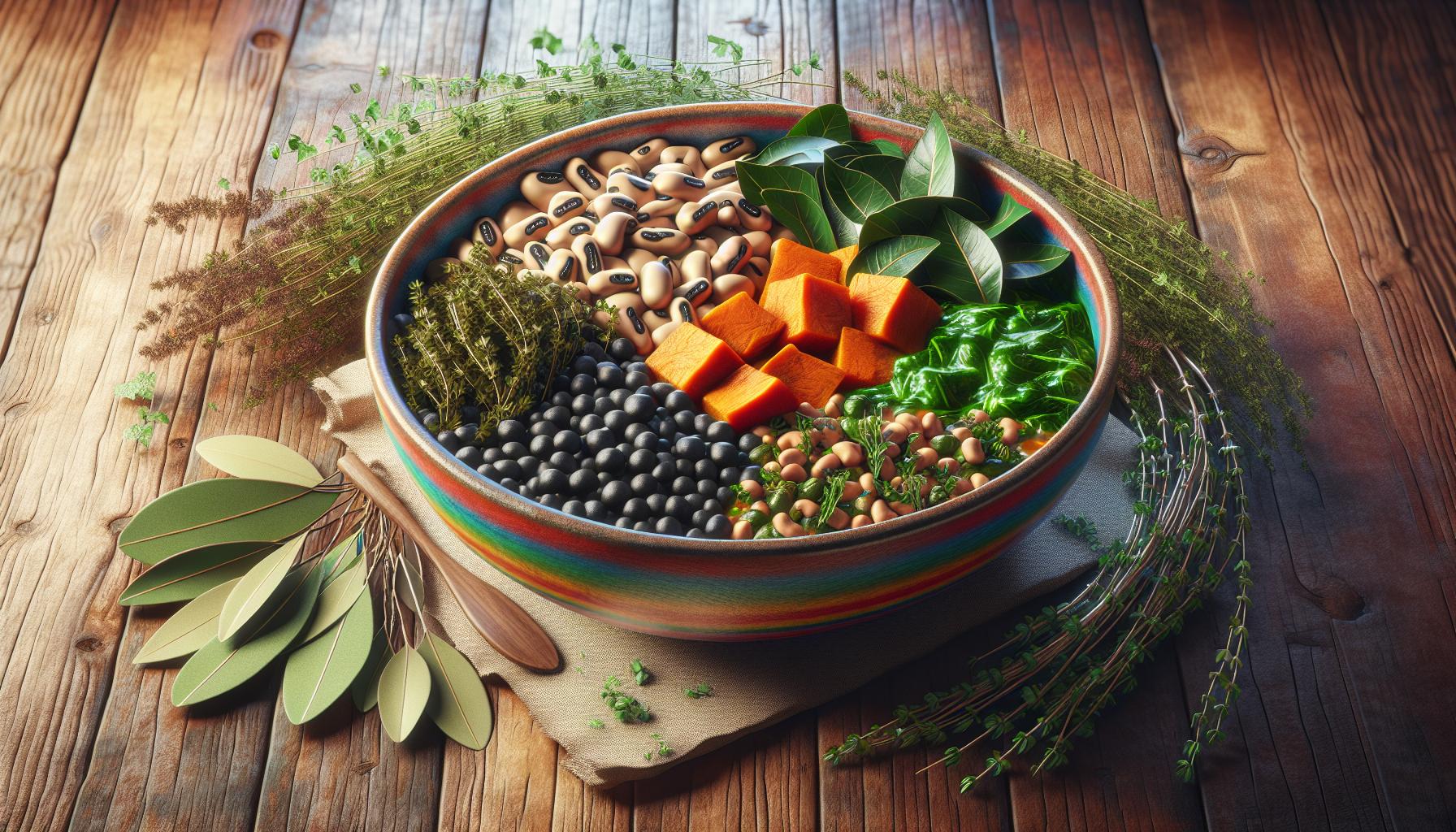The Best Fluffy Pancakes recipe you will fall in love with. Full of tips and tricks to help you make the best pancakes.
From soul-warming comfort dishes to mouthwatering barbecue the rich tapestry of Black culture food tells a powerful story of resilience creativity and tradition. This cuisine has evolved from humble beginnings during times of hardship into some of America’s most celebrated dishes making an indelible mark on the nation’s culinary landscape.
What started in the kitchens of the American South has blossomed into a vibrant culinary movement that spans generations. Black food culture isn’t just about the meals – it’s about family gatherings Sunday suppers and passing down recipes that carry the whispers of ancestors. From collard greens and cornbread to mac and cheese that’ll make you weak in the knees these dishes have become more than just food – they’re a celebration of heritage and community spirit.
The Rich Heritage of Soul Food
Soul food emerged as a distinctive culinary tradition during the era of American slavery when African Americans transformed limited ingredients into flavorful dishes. This resourceful cooking style created lasting recipes that continue to influence modern American cuisine.
Origins in African American History
Soul food originated in the American South during the antebellum period when enslaved people preserved their culinary traditions using available ingredients. The term “soul food” gained prominence in the 1960s during the Civil Rights Movement as a celebration of Black culture identity. Domestic cooks created hearty meals from modest ingredients like greens beans corn rice pork parts sweet potatoes. These dishes sustained families through generations featuring slow-cooking methods smoking meat preservation techniques. Kitchen innovations included repurposing cast-off ingredients transforming them into nutritious meals that became cultural staples.
Key Influences From African Cuisine
African culinary traditions significantly shaped soul food through specific cooking techniques ingredients flavoring methods. West African influences appear in the use of okra black-eyed peas rice yams peanuts. Traditional cooking methods like one-pot cooking deep frying smoking preserved African heritage in American kitchens. Seasoning profiles featuring hot peppers spices herbs reflect West African flavor combinations. Food preparation rituals including communal cooking gathering around meals maintaining oral recipe traditions mirror African customs. These elements combined with American ingredients created distinctive dishes like gumbo jambalaya hoppin’ john that showcase African American culinary innovation.
Essential Soul Food Ingredients

Soul food relies on specific ingredients that form the foundation of traditional Black cuisine. These components blend African heritage with American agricultural traditions to create distinctive flavors and textures.
Traditional Herbs and Seasonings
Soul food’s signature taste comes from a carefully curated blend of herbs and spices. Garlic powder, onion powder, paprika, dried thyme, sage and bay leaves create the base flavor profile for many dishes. Cayenne pepper adds heat while black pepper provides warmth to classic recipes. Fresh garlic, onions and celery form the “holy trinity” of aromatics in dishes like gumbo and jambalaya. Bell peppers contribute sweetness and depth to stews and gravies. Filé powder, made from dried sassafras leaves, serves as both a thickener and seasoning in Creole dishes.
Farm-to-Table Components
Fresh vegetables define soul food’s agricultural roots. Collard greens, mustard greens and turnip greens provide essential nutrients in traditional recipes. Sweet potatoes offer natural sweetness while okra acts as a thickening agent in soups and stews. Field peas, black-eyed peas and butter beans represent staple legumes passed down through generations. Fresh corn transforms into cornmeal for breading and cornbread. Root vegetables like turnips, rutabagas and onions add hearty substance to slow-cooked meals. Local farms supply fresh eggs, buttermilk and cream for baking traditional desserts.
Signature Soul Food Dishes
Soul food features iconic dishes that combine African cooking techniques with American ingredients to create distinctive flavors. These recipes reflect generations of culinary expertise passed down through Black families.
Main Course Favorites
Fried chicken stands as a cornerstone of soul food cuisine, featuring crispy seasoned coating with tender meat inside. Smothered pork chops drenched in onion gravy offer rich comfort on any dinner plate. Chitlins, made from slow-cooked pork intestines, represent a traditional delicacy that honors the resourcefulness of African American cooking. BBQ ribs, coated in sweet tomato-based sauce, showcase the smoking techniques preserved from African traditions. Catfish, rolled in cornmeal and fried until golden, brings the taste of Southern waters to the table. Oxtails braised with aromatics until tender demonstrate the art of transforming tough cuts into memorable meals.
Classic Side Dishes
Black-eyed peas seasoned with smoky ham hocks provide essential protein in soul food meals. Collard greens, slow-simmered with pork neck bones, deliver both nutrition and depth of flavor. Mac and cheese, baked with multiple cheese varieties, creates a creamy centerpiece at family gatherings. Candied yams glazed with butter brown sugar complement savory dishes with natural sweetness. Cornbread baked in cast iron skillets offers a golden-crusted companion to every meal. Hot water cornbread, made from cornmeal mixed with boiling water, presents a simpler variation of the classic bread. Okra, either fried crisp or stewed with tomatoes, reflects direct connections to West African cuisine.
Cultural Significance and Traditions
Black culture food embodies rich traditions centered around communal dining experiences that strengthen family bonds across generations. These culinary customs serve as cultural touchstones that preserve heritage through shared meals.
Family Gatherings and Celebrations
Family gatherings in Black culture revolve around elaborate feasts that mark significant occasions. Sunday dinners bring extended families together for multi-course meals featuring traditional dishes like fried chicken, collard greens, mac and cheese. Holiday celebrations showcase special recipes reserved for occasions like Juneteenth, Kwanzaa, Easter, Christmas. Family reunions feature potluck-style meals where relatives contribute signature dishes passed down through their branch of the family tree. These gatherings transform ordinary meals into meaningful ceremonies that strengthen familial bonds through shared culinary experiences.
Passing Down Recipes Through Generations
Oral tradition plays a central role in preserving Black culinary heritage as recipes flow from one generation to the next. Grandmothers teach granddaughters essential cooking techniques through hands-on kitchen experiences. Family recipes exist as cherished knowledge rather than written instructions, with measurements like “a pinch” or “handful” reflecting the intuitive nature of soul food preparation. Each generation adapts ancestral recipes while maintaining core flavors and techniques. Modern families document these oral traditions through video recordings, recipe journals and social media to ensure preservation. Many Black families trace their signature dishes through multiple generations, connecting present-day cooks to their ancestors’ culinary wisdom.
Modern Interpretations of Soul Food
Soul food continues to evolve in the 21st century, embracing new culinary techniques while honoring traditional flavors. Contemporary chefs reimagine classic dishes through innovative preparations that reflect modern dining preferences.
Contemporary Restaurant Scene
Black-owned restaurants across America showcase innovative takes on soul food classics. Acclaimed establishments like Marcus Samuelsson’s Red Rooster in Harlem serve elevated versions of traditional dishes such as fried chicken with duck fat waffles or collard greens with smoked turkey. Modern soul food restaurants incorporate global influences, introducing fusion elements like Korean-style black-eyed peas or Japanese-inspired crispy catfish. Fine dining venues elevate humble ingredients through sophisticated plating techniques, transforming dishes like mac and cheese into gourmet experiences with premium cheeses artisanal pasta.
Health-Conscious Adaptations
Modern soul food embraces healthier cooking methods while maintaining authentic flavors. Chefs reduce sodium content by using fresh herbs aromatics like thyme rosemary sage. Traditional cooking techniques adapt to include:
- Baking or air frying chicken instead of deep frying
- Using smoked turkey necks rather than ham hocks in greens
- Incorporating plant based proteins like mushrooms tempeh
- Swapping refined grains for whole grain alternatives
- Adding more fresh seasonal vegetables to traditional recipes
These modifications create nutritious options that honor soul food’s legacy. Restaurant menus now feature vegan collard greens cauliflower mac and cheese brown rice jambalaya proving soul food’s ability to evolve with contemporary dietary preferences.
Conclusion
Black culture food stands as a testament to the resilience innovation and enduring spirit of African American communities. From its humble beginnings to its current status as a celebrated cuisine Black food culture continues to bridge generations through cherished recipes and meaningful gatherings.
Today’s evolution of soul food demonstrates its dynamic nature as modern chefs honor traditional flavors while embracing contemporary tastes and dietary preferences. This culinary legacy not only preserves important cultural traditions but also serves as a powerful reminder of the strength creativity and unity found within Black communities across America.

